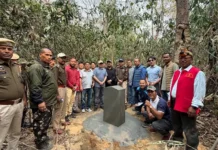ITANAGAR, Jun 7: Supreme Court Judge, Justice NV Ramana released a ‘Handbook of formats: Ensuring effective legal services’ during a webinar with executive chairpersons of the state legal services authorities (SLSA) and members of other legal bodies on 4 June.
Arunachal Pradesh SLSA Member Secretary Jaweplu Chai also attended the programme.
In his address, Justice Ramana said, “The handbook is the crucial step towards standardizing and bringing in uniformity in the use of formats. This handbook is an effective tool for management of human resources, and in future will prove as a small but significant step in realizing justice for all.”
He expressed concern over the spike in reports of domestic violence and child abuse cases during the lockdown, and over the massive reverse migration.
“During such times, when the victims cannot reach us, it is imperative for us to reach them. Acknowledging the urgency of the situation, we have established one-stop centres,” he said.
“Persistent efforts have been taken to provide legal assistance through tele-services of female advocates in every district. In other matters, petitions have been filed under the Domestic Violence Act,” Justice Ramana informed.
He said legal aid and assistance have been provided in 1,559 domestic violence cases, and to 16,391 convicts, 1882 labourers, and 310 tenants, among others.
NALSA Member Secretary Ashok Kumar Jain said the handbook is “expected to improve the managerial framework and bring consistency in day-to-day basic working across the country,” and act as a “guide for panel lawyers and paralegal volunteers on their role.”
The Commonwealth Human Rights Initiative’s (CHRI) prison reforms programme head, Madhurima Dhanuka, presented a brief overview of the handbook.
The handbook, prepared in collaboration with the CHRI, is an attempt to improve the quality of legal services institutions across the country. It contains formats that will enhance data collection, enabling the NALSA to analyze trends and patterns emanating from data, and identification of issues at the micro level.


